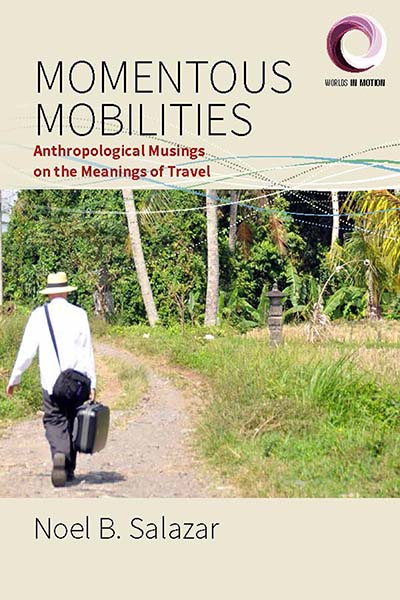A VIRTUAL SEMINAR SERIES OF THE ROYAL ANTHROPOLOGICAL INSTITUTE
Thursday 21 April 2022 at 4.00-6.00pm (BST)
You can register for the Zoom event here:
https://us02web.zoom.us/webinar/register/WN_VvcmOoOfRxKM_Hn6X1M8mQ

Momentous mobilities: anthropological musings on the meanings of travel
The Royal Anthropological Institute is pleased to present ‘Reviewer meets Reviewed’, a discussion between author
Prof Noel Salazar (University of Leuven) and reviewer Dr Sanam Roohi (University of Gottingen), chaired by Prof Florentina Badalanova Geller (Royal Anthropological Institute).
Grounded in scholarly analysis and personal reflection, and drawing on a multi-sited and multi-method research design, Momentous Mobilities disentangles the meanings attached to temporary travels and stays abroad and offers empirical evidence as well as novel theoretical arguments to develop an anthropology of mobility.
Both focusing specifically on how various societies and cultures imagine and value boundary-crossing mobilities “elsewhere” and drawing heavily on his own European lifeworld, the author examines momentous travels abroad in the context of education, work, and spiritual quests and the search for a better quality of life.
The book is published by Berghahn and available here: https://www.berghahnbooks.com/title/SalazarMomentous
Berghahn kindly offers a reduced rate for the book to the attendees of the event. We will share the discount code in the chat during the event.
———————————————————
The review
Journal of the Royal Anthropological Institute, vol. 27, issue 3, September 2021, pp.719-720
Dr Sanam Roohi
This book’s preface opens with a story of Salazar’s first transatlantic trip to Mexico for a wedding, where he is asked to meet a missionary who travels to Rome occasionally, a city in which he would soon be working. A year later, quite unexpectedly, Salazar meets him – not in Rome but in the missionary’s hometown, Kampala. This story lays the foundation for Momentous mobilities’ main theme: a partly reflective and partially ethnographic account of the multiple possibilities, limits, and meanings of travel and mobility. At its crux, the monograph attempts to answer why and how people move and how mobilities vary in intents, outcomes, and processes. From the mundane to the sacred, from rational decisions to changes in personal and family fortune, through to travel as a rite de passage, the author attempts to analyse mobility as a contemporary, all-encompassing phenomenon. Amit’s foreword notes that Salazar combines ‘memoir, ethnography and theory’ (p. xi) to provide insights into the contexts that shape (im)mobilities by engaging with a broad range of scholarship and debates around human movement, juxtaposing personal anecdotes with his multi-sited ethnographic research – the range of which is difficult to match. His multidisciplinary monograph sutures together empirical evidence with theoretical arguments and anecdotal vignettes to offer a panoramic account of the different constitutive elements of mobility that structure human sociality.
The monograph’s introduction theorizes mobility as a sociocultural assemblage, but one which is embedded within a global hierarchy of movement where not all border crossings are valued equally. With travel increasingly becoming circular, the older dichotomies of flows and fixities become redundant. While (im)mobilities are regulated, facilitated, or constrained by social, economic, and political structures, they also engender transformative potential, making such border crossings momentous. As a spatio-temporally expansive analysis of travel – be it for higher education, work, adventure, pilgrimage, or leisure – each of the six chapters explores different dimensions of human movement. Drawing upon older literature on rituals, kinship, travel, and pilgrimage, Salazar weaves his personal stories within the chapters’ empirical and analytical tracts (separated by different fonts), making for a complex reading of mobility from within and without.
The book is divided into two sections. The first part, ‘Imagining mobility’, makes for a compelling read. The ethnographic accounts span locations as diverse as Chile, Indonesia, and Tanzania, and offer sharp insights on how geographies are entangled with the histories of their people, which in turn inflect travel’s meanings and imaginaries. These imaginaries materialize themselves in sociocultural practices specific to each region. For Chileans in exile, Indonesian students, or Maasai nomads, movement redefines the meaning of home, ‘elsewhere’, and themselves in the process.
The second part, ‘Enacting mobility’, turns the gaze to Europe – a continent whose decades-long debates on migration find a new lease on life every few years. Here Salazar explores the long- and short-term cycles of mobility within the continent. Turning a critical gaze upon EU mobility policies and practices, chapters 4 and 5 look at student and labour mobility, respectively. Policy-makers idealize a small group of hyper-mobile Europeans leading expat lives and create a reproducible template for others to follow. Policy strategies around EU Lifelong Learning Programmes or EU Mobility Partnerships are formulated to generate ‘academic capital’ and ‘mobility capital’, akin to other forms of Bourdieusian capital. Mobility strategies, often enforced by policy-makers, are remarkably contrasted in the contemplative last chapter, which examines the ontological questions of being and belonging through the lens of pilgrimage. Starting with his own volunteering experience for Taizé, Salazar sees pilgrims’ onward journeys from the familiar to the extraordinary as a form of self-transformative exercise that finds resonance in every religion. The conclusion reiterates that a grand theory of human mobility is not possible, and an anthropology of mobility needs to problematize the assumptions, values, or imaginaries attached to human mobility and to examine how these are negotiated or contested.
Salazar also examines how transnational mobilities as imagined and enacted currently may exacerbate inequalities; rather than bridging cultures, they may produce immobilities. This is one area that I think could have benefited from a more sustained theoretical engagement. A doctor in Syria currently living as a refugee in Germany and working on a factory floor unsettles (among other things) the premise that transnational migration has a causal relationship with upward social mobility. This interjection aside, Salazar’s book is immensely readable because he is not held back by writing regular academic prose. Momentous mobilities, true to its subtitle, is an intense and meditative musing on the subject. It will be valuable to sociologists, anthropologists, scholars of migration, and non-specialists alike
———————————————————————-
Your support makes all the difference to the RAI
The RAI needs your support. We are an independent charity dedicated to anthropology. Please can you help us with our essential work by making a donation today. With your support we can continue to deliver our inspiring online events programme and run our flagship events (London Anthropology Day, the RAI Film Festival and our international conferences). We can continue our essential support of anthropological research, to care for our archive, manuscript and photo collections and develop our education programmes to create globally informed citizens. Thank you for your interest in this event, we appreciate you supporting the RAI.
To make a donation
Donate with PayPal
Or send a Text Message to add a donation to your monthly mobile phone bill or pay as you credit :
• Text RAISE 3 to 70085 for a one-off donation of £3
• Text RAISE 5 to 70085 for a one-off donation of £5
• Text RAISE 10 to 70085 for a one-off donation of £10
• Text RAISE to 70460 to set up a regular gift of £3 each month, helping fund our vital work long term.
For more information and terms & conditions please go to: https://www.therai.org.uk/support-us/donate
Have you considered becoming an RAI Fellow? https://www.therai.org.uk/joining
Many people from all over the world are affiliated to the RAI. We welcome anyone with an interest in the subject, whether working in an academic institution or not. Our affiliates include academic specialists, students, those working in fields where anthropology has practical applications, and those whose interest is captured by the subject matter of anthropology.
Want to hear more about the RAI’s upcoming events? You can sign up to our mailing list here:
https://us7.list-manage.com/subscribe?u=94e3bf4c82be9b8d19299eb8a&id=f6438860ac


